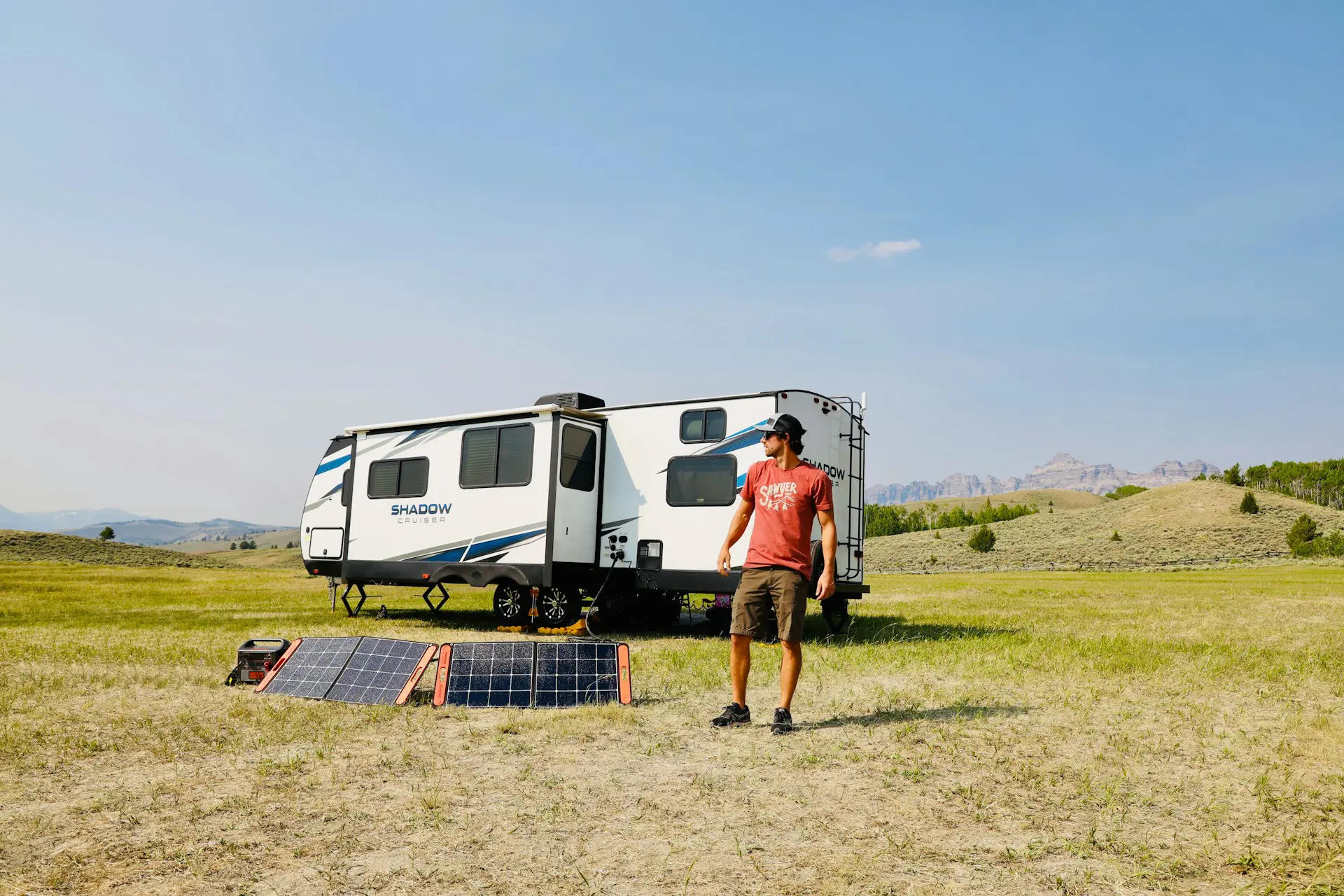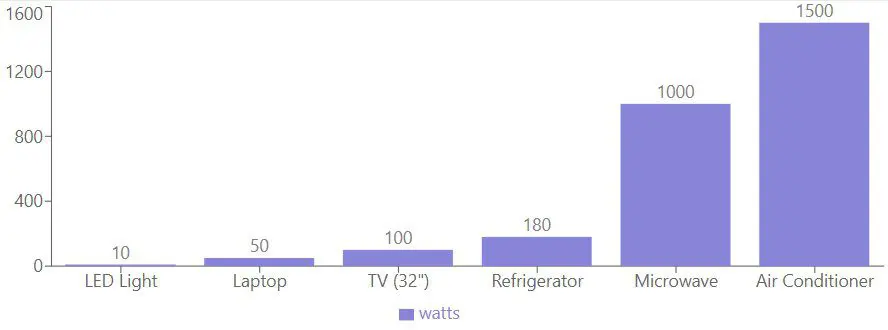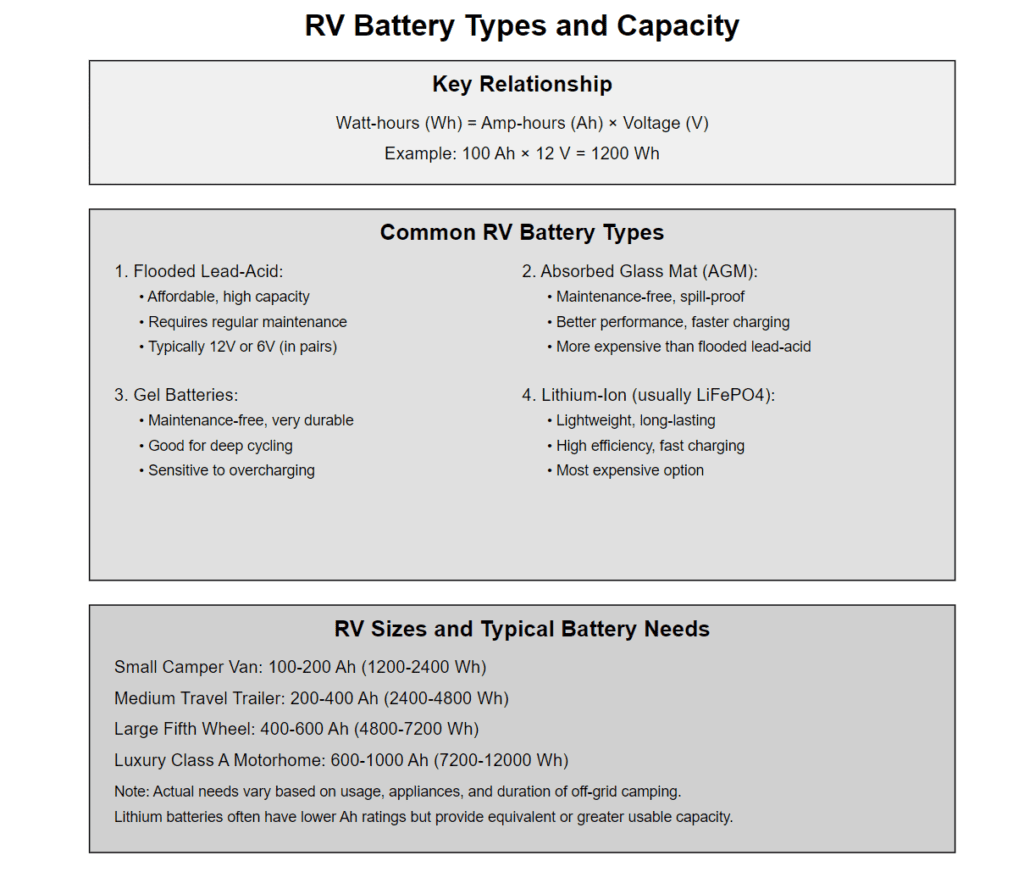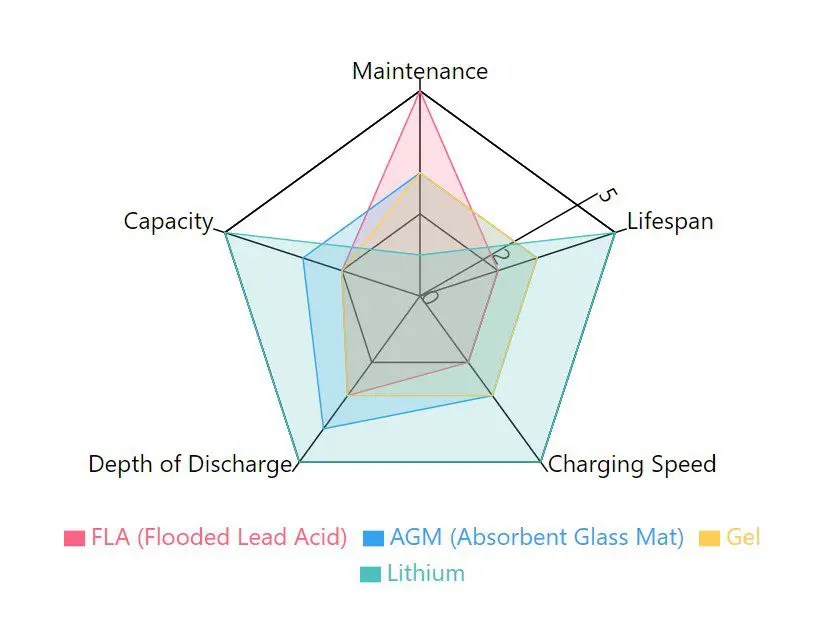For RV adventures, reliable power is key to a great time. Your RV’s battery is the heart of its electrical system. It powers everything, from lights and appliances to safety features. Choosing the best battery for your RV is vital. It’s not just about convenience; you need a reliable power source wherever you go.
In this comprehensive guide, we’ll walk you through the process of choosing the best battery for your RV. We’ll cover RV power needs, battery types, and recommendations. This will help you choose the best option to keep your RV running for years.

Understanding RV Power Needs | What Do I Need to Know When Buying an RV Battery? | Types of RV Batteries | Our Picks: Best RV Batteries | FAQs | More Information | Wrapping Up
Understanding RV Power Needs
Before choosing a battery, know your RV’s power needs. This knowledge will guide you in selecting the best battery for your RV that meets your unique needs.
Calculating Power Consumption
Start by listing all the electrical devices and appliances you use in your RV. Consider both essential items (like refrigerators and water pumps) and comfort items (like TVs and laptops). For each device, note its power consumption in watts and estimate how many hours per day you use it. This will give you a baseline for your daily power needs.
To calculate your daily power consumption:
- Multiply each appliance’s wattage by the number of hours you use it per day.
- Add up all these values to get your total daily watt-hour (Wh) consumption.
Example:
If you use two LED lights for 5 hours, a laptop for 3 hours, and a refrigerator for 24 hours:
- LED Lights: 10W × 2 × 5h = 100 Wh
- Laptop: 50W × 3h = 150 Wh
- Refrigerator: 180W × 24h = 4,320 Wh
Total: 4,570 Wh per day
Here’s a chart of typical power usage, in watts, for common RV appliances:

Determining Battery Capacity Requirements
Once you know your power consumption, you can calculate the battery capacity you’ll need. Battery capacity is typically measured in amp-hours (Ah).
To convert watt-hours to amp-hours (Ah), divide by the battery voltage (typically 12V for RVs):
4,570 Wh ÷ 12V = 380.83 Ah
Typical RV battery capacity requirements:
- Small travel trailer or camper van: 100-200 Ah
- Medium-sized RV or travel trailer: 200-400 Ah
- Large motorhome or Fifth Wheel: 400-800 Ah
- Luxury Class A Motorhome: 600 – 1000 Ah
Assessing Current and Future Power Requirements
Think about both your current needs and potential future upgrades. If you plan to add solar panels or gear or power-hungry devices, choose a battery system that can handle them.
What Do I Need to Know When Buying an RV Battery?
When evaluating the best battery for your RV, consider these important factors:
RV Battery Basics
What is an RV Battery?
An RV battery is a deep cycle battery designed to provide consistent power over long periods. Unlike car batteries, which deliver short bursts of high power to start the engine, RV batteries are built for repeated charge and discharge cycles.
How RV Batteries Differ from Car Batteries
RV batteries and car batteries serve different purposes:
- RV batteries (deep cycle) are designed for sustained energy release over time.
- Car batteries (starting batteries) provide a quick burst of energy to start the engine.
- RV batteries have thicker plates to withstand repeated deep discharges.
- Car batteries have thinner plates and more of them for higher cranking power.
Capacity and Power Output
Capacity, measured in amp-hours (Ah), indicates how much energy the battery can store. For example, a 100Ah battery can theoretically provide one amp for 100 hours, or 100 amps for one hour; however, to preserve the battery’s lifespan, you should only use about 50% of this capacity for lead-acid batteries and 80% for lithium batteries.
Example: If you need 400Ah of capacity for your large motorhome, you might choose:
- 4 x 100Ah lead-acid batteries (allowing for 50% discharge)
- 2 x 250Ah lithium batteries (allowing for 80% discharge)
Power output, measured in watts, determines which appliances the battery can run at the same time. To calculate the power output, multiply the battery’s voltage (typically 12V) by its amp rating.
Example: A 100Ah 12V battery can provide 1,200 watts of power (12V x 100A = 1,200W).
Depth of Discharge
DoD refers to how much of the battery’s capacity can be used before recharging.
- Lead-acid batteries: 50% DoD (using 50Ah of a 100Ah battery)
- Lithium batteries: Up to 80% DoD (using 80Ah of a 100Ah battery)
Using a higher DoD has a major effect on the battery’s lifespan. For instance, a lead-acid battery rated for 1,000 cycles at 50% DoD might only last 300 cycles if regularly discharged to 80%.
Charging Speed and Efficiency
Charging speed is crucial, especially for boondocking. Lithium batteries can charge much faster than lead-acid.
Example charging times for a 100Ah battery from 50% to 100%:
- Lead-acid: 4-6 hours
- Lithium: 1-2 hours
Efficiency refers to how much of the input charge is converted to usable energy. Lithium batteries are typically 99% efficient, while lead-acid batteries are about 85% efficient.
Lifespan and Cycle Count
Cycle count is how many charge-discharge cycles a battery can undergo before its capacity drops significantly.
Typical cycle counts (at 50% DoD for lead-acid, 80% for lithium):
- Flooded Lead-Acid: 500-1,000 cycles
- AGM: 600-1,200 cycles
- Lithium: 3,000-5,000 cycles
This means a lithium battery might last 5-10 years in an RV, while a lead-acid battery might need replacement every 2-3 years.
Weight and Size Considerations
For every 100Ah of capacity:
- Lead-acid batteries weigh about 60-70 lbs.
- Lithium batteries weigh about 25-30 lbs.
This difference is crucial for RV weight limits and fuel efficiency.
Maintenance Requirements
Some batteries need regular maintenance, while others are maintenance-free. Consider your willingness and ability to perform upkeep when choosing the best battery for your RV.
Types of RV Batteries

Flooded Lead-Acid Batteries
Flooded lead-acid batteries are the traditional choice for RVs. They contain liquid electrolyte and need regular maintenance.
Typical Capacity Range:
75-250Ah Common Sizes: 6V (in pairs for 12V systems) or 12V
Pros:
- Affordable ($100-$200 per 100Ah)
- Widely available
Cons:
- Heavy (60-70 lbs. per 100Ah)
- Need regular maintenance
- Limited to 50% DoD
Absorbed Glass Mat (AGM) Batteries
AGM batteries are sealed lead-acid batteries where a fiberglass mat absorbs the electrolyte.
Typical Capacity Range:
50-250Ah Common Sizes: 12V
Pros:
- Maintenance-free
- Can be mounted in various positions
- Better performance in cold weather than flooded lead-acid
Cons:
- More expensive than flooded lead-acid ($200-$300 per 100Ah)
- Still limited to about 50% DoD
Gel Batteries
Gel batteries use a jellified electrolyte and are another type of sealed lead-acid battery.
Typical Capacity Range:
50-200Ah Common Sizes: 6V (used in pairs for 12V systems) or 12V
Pros:
- Maintenance-free
- Excellent deep cycle capabilities
- Resistant to vibration and shock
- Can be mounted in various positions
- Less susceptible to sulfation compared to flooded lead-acid
Cons:
- More expensive than flooded lead-acid and AGM ($250-$350 per 100Ah)
- Slower charging rate than AGM or lithium
- Need specific charging profiles to prevent damage
- Still limited to about 50% DoD for optimal lifespan
Lithium-Ion Batteries
Lithium-ion batteries, especially Lithium Iron Phosphate (LiFePO4), are the newest RV battery tech.
Typical Capacity Range:
50-300Ah Common Sizes: 12V
Pros:
- Lightweight (25-30 lbs. per 100Ah)
- Long lifespan (3,000-5,000 cycles)
- Can use up to 80% DoD
- Fast charging
Cons:
- Most expensive option ($800-$1000 per 100Ah)
- May need special chargers or system modifications
The following chart compares the performance of different battery types across key indicators. (The lower the maintenance score, the better). As you can see, lithium batteries excel in most categories:

Our Picks: Best RV Batteries
Battle Born LiFePO4 Deep Cycle Battery (Best Overall RV Battery):
The Battle Born LiFePO4 is lightweight, powerful, and very safe. It’s designed for reliable, long-lasting power with minimal maintenance. So, it’s ideal for RVers who want performance and convenience.
Specs:
- Type: Lithium-Ion
- Capacity and Power Output: 12V with a continuous output of 100A, supports a range of RV appliances
- Depth of Discharge: Up to 80% depth of discharge, maximizing usable energy.
- Charging Speed and Efficiency: Fast charging capabilities with efficient power conversion
- Lifespan and Cycle Count: Provides up to 5,000 cycles, reducing the frequency of replacements
- Weight and Size Considerations: 31 lbs.
- Maintenance Requirements: Maintenance-free with a built-in BMS for protection, simplifying usage
Trojan T-105 6V Deep Cycle Flooded Lead-Acid Battery (Best Budget-Friendly RV Battery):
As the best budget-friendly option, the Trojan T-105 offers reliable performance at an affordable price. It’s ideal for RV owners who need a cheap, durable battery capable of withstanding deep discharges and heavy use.
Specs:
- Type: Flooded Lead-Acid
- Capacity and Power Output: 6V design with 225Ah capacity, ideal for powering extensive off-grid setups
- Depth of Discharge: 50%
- Charging Speed and Efficiency: Requires regular charging, less efficient than lithium counterparts
- Lifespan and Cycle Count: Up to 1,600 cycles, durable construction
- Weight and Size Considerations: 62 lbs., requires sturdy mounting
- Maintenance Requirements: Regular maintenance needed, including water levels checks
Renogy 12V 200Ah Smart Lithium Iron Phosphate Battery (Runner-Up Lithium-Ion):
Renogy’s Smart Lithium Ion Phosphate Battery is a top choice for those seeking the latest in battery technology. Its smart monitoring and power management make it the best lithium-ion battery for modern RV setups.
Specs:
- Type: Lithium-Ion
- Capacity and Power Output: 12V and 200Ah, providing ample power for many devices.
- Depth of Discharge: Allows for up to 80% usage of the stored energy.
- Charging Speed and Efficiency: High charging efficiency with smart monitoring via Bluetooth.
- Lifespan and Cycle Count: Over 2,000 cycles at 80% discharge, with a long service life.
- Weight and Size Considerations: 51 lbs., fits well in limited spaces.
- Maintenance Requirements: Low maintenance with smart technology for easy monitoring.
VMAXTANKS 6 Volt 225Ah AGM Battery (Best AGM Battery for RVs):
The VMAXTANKS AGM battery is reliable and maintenance-free. Its strong build and high power capacity make it perfect for RVers who value steady, long-lasting power.
Specs:
- Type: AGM
- Capacity and Power Output: 6V with 225Ah, strong enough for large RVs
- Depth of Discharge: 80%, excellent for applications requiring deep discharge
- Charging Speed and Efficiency: AGM technology enhances charging efficiency
- Lifespan and Cycle Count: 3000 cycles at 50%, 1200 – 1500 cycles at 80%
- Weight and Size Considerations: 77 lbs.
- Maintenance Requirements: Minimal maintenance due to sealed AGM design
Renogy Deep Cycle AGM Battery 12 Volt 200Ah (Best Deep Cycle RV Battery):
The Renogy Deep Cycle AGM Battery 12 Volt 200Ah is known for its reliability and durability. It is a great choice for off-grid setups, RVs, and backup power systems. It combines high-capacity storage with the resilience for frequent, deep discharges. This ensures consistent power in demanding environments.
Specs:
- Type: AGM
- Capacity and Power Output: 12V with 200Ah, ideal for high-capacity needs in off-grid applications and RV setups
- Depth of Discharge: 80%
- Charging Speed and Efficiency: Charges effectively, even in low sunlight
- Lifespan and Cycle Count: 1200 cycles at 50% DoD, 600 – 800 cycles at 80% DoD
- Weight and Size Considerations: Weighs approximately 128 pounds, requiring consideration for installation space and support
- Maintenance Requirements: Requires minimal upkeep due to its durable AGM construction.
Frequently Asked Questions About RV Batteries
Can I use a car battery in my RV?
While possible in emergencies, it’s not recommended for regular use. Car batteries aren’t designed for deep cycling and will quickly degrade under RV use.
How often should I charge my RV battery?
Always keep your battery charged. For lead-acid batteries, avoid discharging below 50%. Lithium batteries can be discharged further but regular recharging is necessary.
Can I mix different types of batteries in my RV?
It’s not recommended to mix different battery types or ages in the same bank, as this can lead to uneven charging and reduced overall performance.
How do I maintain my RV battery?
Maintenance depends on the battery type. For flooded lead-acid batteries, check the water levels at regular intervals. For all types, keep terminals clean and ensure proper charging.
What are the signs of a failing RV battery?
Signs include reduced capacity, slow charging, and leaks. Also, look for difficulty holding a charge and physical deformities.
How do I deal with sulfation in lead-acid batteries?
Regular charging and avoiding deep discharges can prevent sulfation. For existing sulfation, specialized chargers or professional reconditioning may help.
What should I do if I experience uneven charging in my battery bank?
Ensure all batteries are the same type, age, and capacity. Check connections and consider using a battery balancer.
How do I properly store my RV battery?
For long-term storage, fully charge the battery and disconnect it. Store in a cool, dry place and recharge periodically.
What are some tips for extending my RV battery’s life?
- Avoid deep discharges.
- Keep the battery charged.
- Protect it from extreme temperatures.
- Perform regular maintenance as required for your battery type.
Where Can I Get More Information on RV Batteries?
- RV Battery Calculators: Tools like Unbound Solar’s Off-Grid System Sizing Calculator can help you find your battery bank and power needs.
- Further Reading: “RV Electrical Systems” by Bill Moeller is a great resource. It covers troubleshooting, repairs, and improvements.
- Solar Setup Guide: Check out Go RVING’s site for insights on integrating solar with your RV battery system.

Wrapping Up: Powering Your Adventures with the Best RV Batteries
Choosing the best battery for your RV is a crucial decision that impacts every aspect of your travels. By knowing your power needs, battery types, and key metrics, you can choose a reliable power source for all your adventures.
Remember, the best battery for RVs isn’t a one-size-fits-all solution. Consider your specific needs, budget, and long-term plans when making your decision. Whether you choose lithium-ion for high performance or lead-acid for reliability, the right battery will keep your RV powered and ready for the road.
Call to Action
We’d love to hear about your experiences with RV batteries! Have you found the perfect power solution for your rig? Share your thoughts in the comments below. And don’t forget to subscribe to our blog for more RV tips, tricks, and guides to make your adventures even better. Happy camping!
Related Resources
- Taking your RV to the Smoky Mountains? Check out the best restaurants in the Pigeon Forge and Gatlinburg areas for every taste and occasion.
- Thinking of a more permanent solution to minimalist living and connecting with nature? Check out our guide to tiny house living along with some kit suggestions to get you started.
- Taking your pooch with you in your RV? Check out our list of the best travel gear your dog must have before you go.


Leave a Reply